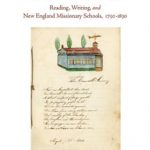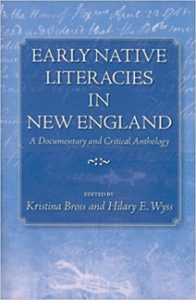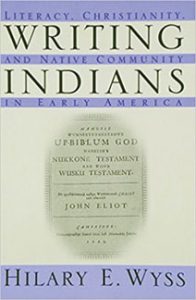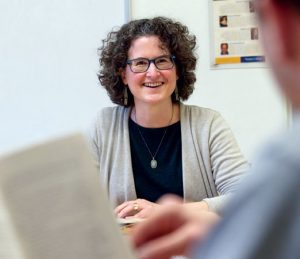What the arrival of Hilary Wyss means for Trinity
By Maura King Scully
When does personal correspondence become literature? This question lies at the heart of the work of Hilary Wyss, the new Allan K. Smith and Gwendolyn Miles Smith Professor of English at Trinity.
“What is literature except writing, with a certain form, structure, and intention?” she asks. “If you think about literature like that, it opens all sorts of possibilities and can really add to the conversation.”
For the past two decades, Wyss has been adding to the conversation about Native American literacy in 18th-century New England. By carefully examining letters and other documents in regional archives, she explores how indigenous peoples used the tools of literacy offered by Christian missionaries to help maintain their culture and identity. The scholar, whose work occurs at the intersection of fields such as early American literature, history, cultural studies, and Native American studies, has written more than a dozen articles and book chapters on the topic. She also has three books to her credit.
NATIONAL PROFILE
Wyss says that she came to appreciate North America’s indigenous peoples after moving to New Mexico after college. “The Native experience is so present and so powerful there. I became interested in Native American cultures in a way I might not have been if I hadn’t lived in New Mexico.” Wyss’s graduate work at the University of North Carolina at Chapel Hill coincided with a rediscovery of William Apess, a 19th-century Pequot writer from New England. “While I was in graduate school, his autobiography was republished, which transformed the field in a lot of interesting ways,” she notes. “He was an ordained Methodist minister whose commitment to his Native American community was both deeply political and quite radical. His work led some of us to look for more writing by Native people in even earlier periods, which is how I ended up working in the colonial period,” says Wyss. Her interest in the era has become a professional calling: she is past president of the Society of Early Americanists and has served as an editorial board member of the journal Early American Literature.
According to Associate Professor of English Chloe Wheatley, chair of the department, Wyss is an ideal successor to Paul Lauter, Allan K. Smith and Gwendolyn Miles Smith Professor of English, Emeritus, the first to hold the title. “Paul is a very prominent Americanist and general editor of the Heath Anthology, which really opened up the canon of American literature,” she explains. “When he retired, it felt weighty: Who would follow him? Hilary is fitting because she is also someone with a national profile whose work opens up new areas of study. Hilary’s groundbreaking scholarship is redefining how literary studies engages with Native American writing. And she’s very clearly an invested teacher. She won numerous teaching awards at Auburn University, where she joined the faculty immediately after earning her Ph.D. Hilary brings wonderful experience—and her interdisciplinary ways—to Trinity,” Wheatley concludes. “And she has a passion to engage with students and departments across campus.”
Wyss considers her fall 2017 arrival at Trinity a homecoming of sorts. “The Connecticut Historical Society archives have always been central to my work, so I’ve spent a lot of time in Hartford,” Wyss says. “In coming to Trinity, I am walking on historical ground that’s been the subject of my research for a long time. It’s been a way of turning my abstract intellectual world into a lived experience.” Wyss also feels quite at home on campus. “The English Department is extraordinary,” she reports. “Faculty meetings are intimate; you can engage with each other in thoughtful discussions. Auburn is a big university; Trinity feels like Hamilton College, where I went as an undergraduate.”
EXPLORING NEW TERRITORY
With Wyss’s arrival, Trinity has what Dean of Academic Affairs and Professor of Language and Culture Studies Anne Lambright calls a “critical mass” of faculty interested in indigenous and Native studies. Last fall, Wyss, Lambright, and Assistant Professor of History and American Studies Tom Wickman launched an Indigenous Studies Working Group to consider options for scholarship, speakers, and course clusters, as well as alliances with Harford-area institutions and engagement with local Native American groups. With a dozen faculty and staff representing political science, American studies, English, Spanish, history, religious studies, the Writing Program, and the library, the group began by reading Red Pedagogy: Native American Social and Political Thought by Sandy Grande.

Hilary Wyss, Allan K. Smith and Gwendolyn Miles Smith Professor of English, joins other faculty members at a meeting of the new Indigenous Studies Working Group.
Photo: Nick Caito
“We met a few times to discuss the book and then invited the author to come and speak to the group,” says Wyss. “It’s been so exciting to see the response. We’re learning a lot from each other.”
Alicia Abbaspour ’18, an English and international studies double major, is in the group, and she’s also taking Wyss’s “Native American Literature and Theory” course. She says that Wyss’s careful selection of materials and literature has allowed students to revisit their own perceptions and stereotypes. “I’ve had to interrogate my own instinctual way of reading to attain a deeper understanding of Native literature. Part of reading Native literature is revisiting Native history and the American colonial past,” Abbaspour says. “This requires us to challenge the ways we think about American history, who has written our history books, and why we believe the myths that we have been told.”
Cheryl Greenberg, Paul E. Raether Distinguished Professor of History and a group participant, says, “The experience has been amazing.” Though she now teaches courses in African American studies, Greenberg’s master’s work was in Native American studies. Taking part in the group is “a chance to have an intellectual conversation across disciplines rooted in a Native American studies approach. Red Pedagogy was not only about Native American studies itself but how to approach subjects and teach in a different way. Our reading and conversation has affected the way I teach, the way I ask questions, and even what questions to ask.” Greenberg is looking forward to the next group read, Our Beloved Kin by Lisa Brooks. She also says she hopes that the Indigenous Studies Working Group becomes “a springboard for something more durable and that we’re able to offer a more serious, organized indigenous studies program.”
Lambright, who herself is a citizen of the Chickasaw nation, thinks this is a distinct possibility. For example, Red Pedagogy author Sandy Grande teaches at Connecticut College. “Discussions started on the possibility of joining forces to perhaps one day be able to offer a minor,” Lambright says. “We have the ability for students to attend courses at Wesleyan and Connecticut College using synchronous video. Trinity and Wesleyan students are already taking a Hispanic studies course together this way.” With Native and indigenous studies, “next steps include exploring potential curricular collaborations among the three schools. In the meantime, we’ll be considering ways to incorporate Native and indigenous issues within our own teaching.”
Lambright says the time is right for Trinity to explore such initiatives. “There’s growing interest in Native American and indigenous studies across the country,” she says. “This a way to honor Native peoples, recover Native history, and reconceive our national narrative.”

BOOKS BY HILARY WYSS
English Letters and Indian Literacies: Reading, Writing, and New England Missionary Schools, 1750–1830
University of Pennsylvania Press, 2012
 Early Native Literacies in New England: A Documentary and Critical Anthology
Early Native Literacies in New England: A Documentary and Critical Anthology
University of Massachusetts Press, 2008, co-edited with Kristina Bross
 Writing Indians: Literacy, Christianity, and Native Community in Early America
Writing Indians: Literacy, Christianity, and Native Community in Early America
University of Massachusetts Press, 2000

